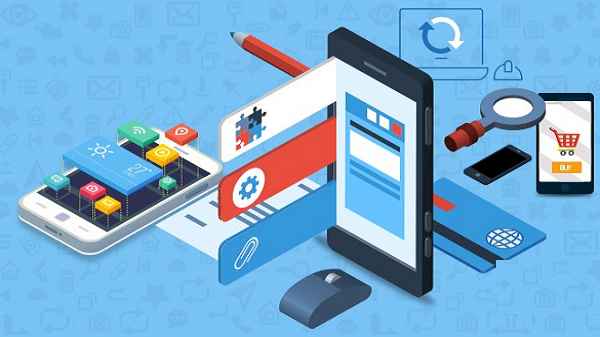In today’s fast-paced digital era, it’s nearly impossible to fathom existence devoid of apps. From socializing to shopping, apps have seamlessly integrated into our daily routines. The number of mobile app downloads worldwide has been increasing constantly from 2016 onward, surpassing 200 billion in 2019. In this article, we shall delve into the factors behind their ubiquity, the domains they permeate, app statistics, and the advantages of embarking on a journey to develop your app and estimate the cost to develop your app. So, let’s dive right in and explore the captivating realm of apps!
Why Have Apps Become an Integral Part of Everyday Life?
The ascent of apps can be attributed to several factors that have rendered them an indispensable aspect of our day-to-day lives. According to a report, users spent a record-breaking 4.2 hours per day on mobile apps in 2020, a 30% increase compared to 2019. Here are a few reasons why apps have achieved such unprecedented popularity:
- Unmatched Convenience: Apps offer unparalleled convenience by granting us instant access to services and information. Whether it’s ordering food, hailing a ride, or managing finances, apps streamline our lives, making them more efficient.
- Seamless Connectivity: Apps have revolutionized interpersonal connections. Social media platforms like Facebook, Instagram, and Twitter have transformed the way we communicate, enabling us to remain connected with friends and family across the globe. Messaging apps such as WhatsApp and Telegram have revolutionized instant messaging, making it effortless and fluid.
- Personalized Experiences: Apps cater to our individual preferences and requirements. By incorporating customizable settings and personalized recommendations, apps provide tailored experiences. Music streaming apps like Spotify and personalized news apps like Flipboard exemplify how apps adapt to our inclinations.
- Time-Saving: In a world where time is of the essence, apps help us reclaim precious minutes. Mobile banking apps allow us to manage finances on the go, while productivity apps like Trello and Evernote aid in organizing tasks and amplifying productivity.
Areas of Life Where Apps Thrive

Apps have permeated virtually every facet of our lives. Here are some domains where apps have exerted a significant impact:
- Communication: Messaging apps like WhatsApp, Messenger, and WeChat have revolutionized interpersonal communication and interaction.
- Social Networking: Apps like Facebook, Instagram, Twitter, and LinkedIn have redefined social networking, empowering us to connect with friends, share moments, and forge professional networks.
- Entertainment: Streaming apps like Netflix, Amazon Prime Video, and Disney+ have reshaped the way we consume entertainment. Gaming apps such as Fortnite and Pokémon GO have propelled the gaming experience to unprecedented heights.
- Travel: Apps like Google Maps, TripAdvisor, and Airbnb have simplified travel planning, rendering navigation in unfamiliar territories a breeze.
- Shopping: E-commerce apps like Amazon, eBay, and AliExpress have revolutionized the retail landscape, offering convenience and an extensive array of products at our fingertips.
As you see, apps take part in every part of our lives. No wonder why it seems so beneficial to develop your app. Below we will look at the advantages closer.
Why, as a Business, You Should Develop Your App

- Revenue Generation: Developing your app unlocks fresh revenue streams. Successful apps can yield substantial income through various monetization strategies. These encompass in-app purchases, subscriptions, premium features, and advertising. For instance, popular gaming apps like Candy Crush and Clash of Clans have reaped millions through in-app purchases. Additionally, apps like Tinder and TikTok have seamlessly implemented subscription models, endowing users with enhanced features and experiences.
- Business Expansion: An app can serve as a potent tool for business expansion. By offering a mobile app, you can broaden your reach, tapping into the burgeoning mobile market. Apps facilitate the extension of your brand’s footprint, enabling you to engage with customers on a more intimate level. For example, companies like Starbucks and Domino’s Pizza have harnessed the power of their mobile apps to facilitate convenient ordering, loyalty programs, and personalized promotions, engendering heightened customer engagement and brand loyalty.
- Enhanced User Experience: Crafting your own app empowers you to fashion a seamless and personalized user experience. You can tailor the app’s features and functionalities to cater to the specific needs of your target audience. By comprehending their preferences and behavior, you can furnish personalized recommendations, customized offers, and streamlined interactions. This heightened user experience can significantly bolster customer satisfaction and foster loyalty.
- Streamlined Operations: An app can streamline internal business processes, engendering enhanced efficiency and productivity. By developing your app for your business operations, you can automate repetitive tasks, centralize information, and facilitate improved collaboration among team members. Project management apps like Asana and Trello facilitate effective task coordination and management, ensuring seamless workflows and punctual project completion.
- Competitive Edge: In today’s fiercely competitive market, having your own app can confer a competitive advantage. By proffering a distinctive and captivating app experience, you set yourself apart from competitors, magnetizing a larger customer base. An app can function as a potent branding tool, enabling you to showcase your products or services, disseminate company updates, and communicate your brand’s values. This cultivates a robust brand presence and instills customer trust and loyalty.
- Data Collection and Analysis: Developing your app endows you with invaluable data insights regarding your customers’ behavior, preferences, and purchasing patterns. By scrutinizing this data, you can make well-informed business decisions, optimize your marketing strategies, and enhance your products or services. Acquiring a deeper understanding of your customers enables you to target them with more relevant offers, ultimately driving sales and business growth.
- Direct Communication Channel: An app establishes a direct and instantaneous communication channel between you and your customers. You can dispatch push notifications to users, keeping them abreast of vital updates, new product launches, or exclusive offers. This direct communication stimulates engagement and encourages customers to actively interact with your brand.
- Offline Functionality: Unlike websites that necessitate an internet connection, apps can operate offline. This functionality permits users to access specific features or content even without an internet connection. Offline functionality elevates the user experience by ensuring uninterrupted access to key features, such as perusing articles, viewing saved content, or utilizing specific app functionalities.
By considering these benefits, the immense value of developing your app becomes evident. It opens doors to revenue generation, business expansion, enriched customer experiences, streamlined operations, competitive advantages, data-driven decision-making, direct communication, and offline functionality. Crafting a successful app mandates meticulous planning, market research, and a user-centric approach. So, why wait? Take the leap and start to develop your app today!
Getting Started: Assessing Risks and Potential Success

Before starting to develop your app, it is crucial to assess the risks and potential for success. Here’s a step-by-step guide to help you get started:
- Define Your Idea: Clearly articulate the purpose and functionality of your app. Conduct market research to identify any existing competitors.
- Conduct Market Research: Analyze the demand for your app idea, pinpoint your target audience, and gain insights into their needs and preferences.
- Create a Prototype: Develop a prototype or minimum viable product (MVP) to test your app’s core features and gather valuable feedback.
- Plan Your Budget: Determining the budget for app development is paramount. Factors that influence the cost include app complexity, features, design, and platform compatibility.
- Choose a Development Approach: Decide whether to develop your app as a native solution (iOS or Android) or explore cross-platform development frameworks like React Native or Flutter.
- Hire a Development Team to develop your app: Find a reputable development team or consider outsourcing the project to professionals who can breathe life into your app idea.
- Test and Refine: Conduct rigorous testing to identify and rectify any bugs or issues. Continuously gather user feedback and make necessary improvements.
- Launch and Market: Devise a strategic launch plan, create a comprehensive marketing strategy, and promote your app across various channels to gain visibility and attract users.
Conclusion
Apps have seamlessly integrated into our daily lives, offering convenience, connectivity, and personalized experiences. From communication and entertainment to travel and shopping, apps have revolutionized the way we interact with the world. By understanding the benefits of developing your own app and adhering to a structured approach, you can tap into the immense potential of this digital landscape. So, why not seize the opportunity and explore the possibilities of creating your very own app? Remember, the world is at your fingertips!
Read also:
- 5 Reasons to Use Helpdesk Software in Business
- Branding Business: Building the Personality of Your Company
- Thinking of Starting a Business? Top Software You Need
- How to Choose a CRM Software as a Small Business Owner
- Rising Importance of Data Security for Businesses
- How Enterprise Application Development Benefits Your Business
- Business Tips: The Importance Of Having A Good Logo
- How to Use Tech Advancements to Recover Sales of Your Business?



